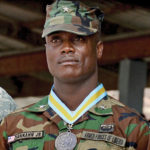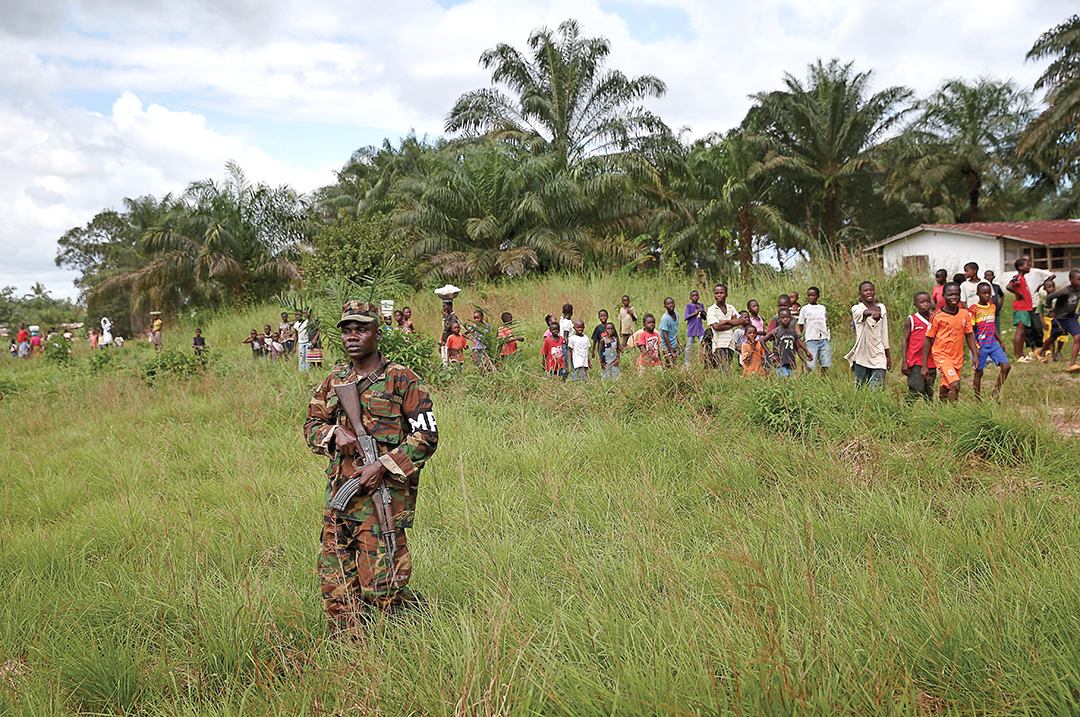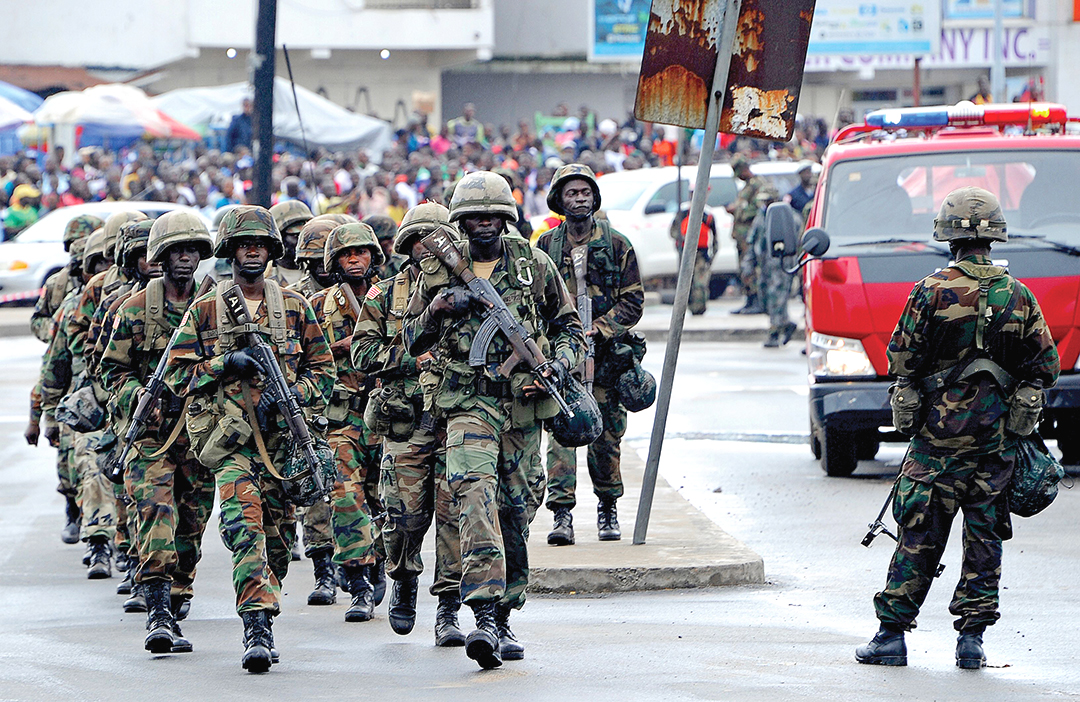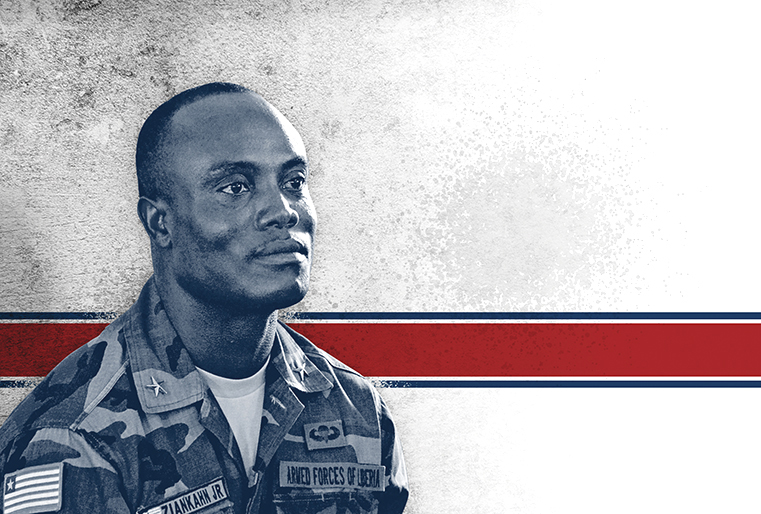Brig. Gen. Daniel Ziankahn says the Armed Forces of Liberia emerged from the country’s Ebola crisis stronger and ready to lead

Brig. Gen. Daniel Ziankahn is the chief of staff of the Armed Forces of Liberia (AFL). Appointed to the top post in 2014, he is the first Liberian to lead the military since the end of the nation’s civil war in 2003. Before his current position, he served as a platoon leader and as the military assistant to the Minister of Defense, the AFL-deputy assistant chief of staff for operations, and executive officer and later commander of the 23rd Infantry Brigade. He holds a Master of Military Art and Science degree from the U.S. Army Command and General Staff College. He spoke to ADF from Monrovia. This interview has been edited to fit this format.
Q: Would you mind talking about the Liberian civil war? How did that shape you personally, and did that impact your perspective on the importance of national security?
A: The civil war impacted every Liberian, whether you were in the country or not and, for the most part, I was in Liberia. I was in my late teens when the civil war came. You can imagine being the only boy of your mother’s nine children. You know that she would be heartbroken if she heard that you were partaking in the civil war, so I was always closer to her. We had to flee Monrovia to go in the hinterland in Rivercess County where I hail from. I still remember a lot of stuff about the civil war because I had to come back [to Monrovia] in 1992 to continue my education, and Operation Octopus [a bloody assault on the capital by forces loyal to ex-president Charles Taylor] was occurring. My parents’ house was burned to ashes. I lost a lot of good friends and family members in the destruction. So coming out of the civil war, I think it impacted us in many more ways than one. There are a lot of hard memories.
Q: One of the lasting impacts of the civil war was the damage done to the reputation of the army in the eyes of Liberian civilians. How have you worked with Liberian civilian officials and international partners to rebuild and rebrand the Armed Forces?
A: That was one of the things that drew me to the AFL, because we saw a lot of factions in the former armed forces that depended on which region they came from in the country and the tribal alliances and all that stuff. So people were not trusting the military. What brought some of us to the military was the chance to be a part of the whole restructuring process of creating the new Armed Forces. There were some allegations in the past that the merit system was not followed. So after the Accra Peace Accord, ECOWAS [the Economic Community of West African States] and the United States government took the lead to restructure the military, and they set some standards. This whet some of our appetites, and that’s what brought us here. There is a lot that we still have to do because trust is something that is earned. It’s not something that you can buy or you can force upon people.
Q: What are you doing to earn that trust?
A: We’re trying to have a good civil-military relationship. You have our military right now going into the hinterland of Liberia to try to carry on some rehabilitation work. We have the engineers and the medical unit doing outreach. Besides that, the way we teach our Soldiers to be with the communities, those are things that are bringing some degree of certainty to the Armed Forces. And, can you imagine, for the first time in five decades, we are partaking in international peacekeeping. We are part of MINUSMA [the United Nations Multidimensional Integrated Stabilization Mission in Mali].
We’ve also increased education standards. The high school diploma is the minimum [to enter the AFL]. All the officers must have their first degree. And, interestingly, once you pass the level of captain and go to major, you have to go to the commanding general staff college. If you looked at the percentage of my officers, captain and above, about 90 percent have their master’s degrees. If you look at that level of education, I think this helps give the communities some level of trust. But education alone isn’t enough; you have to bring some positive attitude in the way you deal with people.

Q: Let’s move on to the Ebola outbreak. As a new chief of staff, what was the first thing that went through your mind when it was clear the AFL would be at the forefront of responding to Ebola?
A: That was one of my crucibles, if I could call it that. The Ebola outbreak began in 2014, right after I got appointed, but it was not as deadly on a wide scale at that point because it had begun just at the border with Guinea in Lofa County. I left that same front just around the same time in July to go to Boston and attend the John F. Kennedy School of Government and do some senior manager courses. While I was there a state of emergency was declared, and the president ordered the AFL to be deployed to help in trying to secure some of the Ebola treatment units, escort VIPs and escort medical personnel. Prior to that we had been on some missions along the border, we had been on Operation Restore Hope I and II along the Ivoirian border. But that was our first time to be deployed in the city in such a role. One of the problems that we had was lack of logistics, because this was during the height of the rainy season so it was kind of difficult, and we didn’t have the type of vehicles to move in the hinterland.
Q: What specific challenges did you face in coordinating with neighboring countries such as Sierra Leone and Guinea during the Ebola response?
A: The very first thing, I know for sure we did not have the infrastructure in place to handle the Ebola crisis. That was not unique to Liberia — it was the entire Mano River Basin. There was no contingency plan that was put into place for such an epidemic. There was an absence of consultative mechanism. Who do you talk to? Everybody just wanted to be in their lane. Do you talk to this NGO, or this minister of health, and who should be in charge? It was this problem of who should really take charge of the whole issue, and that’s what prolonged everything. In my country, for example, you would have the health minister who wanted to take charge, maybe an NGO like Samaritan’s Purse, they wanted to get the relief stuff that is coming in. We had the U.S. coming in with Operation United Assistance; we also had people from the African Union and ECOWAS as well. So the problem was that we didn’t have the consultative mechanism. I ended up picking up the phone and talking to my counterpart from Guinea or my counterpart from Côte d’Ivoire or Sierra Leone, but again they were not in charge. They were just trying to prop up the efforts of the health workers or maybe the police, so it was a great challenge. But I think right after that there were a lot of conferences held and a lot of consultation, and I think this is why the second wave and the third wave of Ebola were easily defeated as opposed to the first wave.
Q: Are you confident now that if something like this happens again there is a plan in place to address it?
A: Sure. There will always be some discrepancies, but with the lessons learned I think we can tackle 99.9 percent. I must be quite sincere and say logistics remain a big problem. You can get all of the mechanisms into place, you can get all of the training, you can get the ideas, but if you lack some level of mobility, it is crucial. Say if I were to move from Monrovia on a 50-mile journey, if there is a bridge that was cut, logistics would still be an issue. But the way we dealt with the second wave and the third wave and the fourth wave [of the outbreak], I’m confident that we can try to get over this hump.
Q: What would be the biggest changes you’d make to the Ebola response if you were to do it differently?
A: If I were called upon to do it differently, not just me but the leadership of the AFL, we would not want to deploy in the forefront because we are not really trained for internal security operations. We would only be serving as a backup to the Liberian National Police; they should be the ones doing their job. We should only be there to back them up. Our primary responsibility is to defend the territorial integrity of this country from both external and internal [threats], so in the cases of what we call “military operations other than war,” I think we should be trying to help. And besides that, I think we shouldn’t have employed live rounds because that was not a war zone. I think using blank rounds and other measures, those are things that we would do differently.

Q: What specifically did the AFL’s clash with civilians while trying to enforce a quarantine at West Point teach you?
A: There were lives that were lost. That was one of my biggest regrets since I’ve been chief of staff. There were a lot of calls from the international community and from the local dailies; when you turned the pages of the newspapers, you would see people writing that the AFL killed unarmed civilians, but like I told you those are lessons learned. It was unfortunate that someone had to lose their life. No parent should have to bury a child, but this is it. That moment did not define the Armed Forces of Liberia. Those individuals were involved in what I would call the West Point scandal, they were [punished according to the Uniform Code of Military Justice]. That’s the good thing about the Armed Forces of Liberia; we do not shoot our Soldiers, we do not take them to the barracks and try to hide them. We try to expose those who have brought some embarrassment to the AFL. And that’s what institutions should be doing. There will be someone who goes astray. There will be some bad apples, but the inability of an institution to reprimand those who go above the law makes the institution bad. We were able to take some concrete action. There is no military commander from antiquity to modernity that will control the actions of every individual Soldier, but what that commander can do is hold every Soldier accountable for their individual actions. This is what we did, and it sends a message.
Q: Do you think the response to the Ebola crisis afforded the AFL an opportunity to rebrand itself in a positive way in the eyes of Liberian citizens?
A: When they saw us building those Ebola treatment units along with the U.S. military, along with the Screaming Eagles [the 101st Airborne Division], it made an impact. We were in Bomi County, and it was our corps of engineers that was doing all of that, so the citizens saw us doing our jobs. We were able to rebrand ourselves, and that was just one of those moments where we tried to change the perception of the AFL for the Liberian populous.
Q: July 1, 2016, marked the official end of the U.N. Mission in Liberia (UNMIL). How significant a milestone is the recent drawdown of the UNMIL forces? How would you assess the AFL’s readiness to provide security nationwide? [Editor’s Note: UNMIL has since agreed to extend its mandate to the end of 2016, although the AFL has taken over full security responsibilities in the country.]
A: Some people are not happy because they became used to the international presence. The civil war in Liberia just subsided in 2003, and since then the international community has been here. It is not that they don’t have confidence in their own security system, but they are also thinking that if UNMIL leaves, could there be another outbreak of civil war? These feelings are natural. Some people are still licking their wounds from the civil war. Some people are still traumatized. I think the real test will come when the U.N. pulls out and people see how we deal with issues. This is the irony of the whole thing. For the first time it is the AFL and the Liberian National Police doing all of the work; UNMIL has just been in the back seat looking out. For example, it has been more than two months since we took over the explosive ordnance disposal responsibility. Our response team has been collecting all of the remnants of war. The Liberian National Police have been doing all of the patrols. But the people have some legitimate reason to be cautious because of all of the madness of the civil war, and since it ended, the only force they’ve known is UNMIL. But yes, the good thing about it is we have been prepared for this. And while UNMIL was a multinational force and we can’t match them man for man or weapon for weapon, what we can do is we can be deployed strategically and we can try to work with the citizens. National security is a jigsaw puzzle, and everybody has to bring a piece of that puzzle. The success rests on the shoulders of the citizens. That’s why we have good civil-military relations with the people. It is those people we are trying to defend, but we also need their human intelligence and to interact with them, so it’s not just a one-way street. I’m confident the AFL will play its role, and if other parts of the security apparatus play their role and everybody knows their role, we can work together for total security.


Comments are closed.